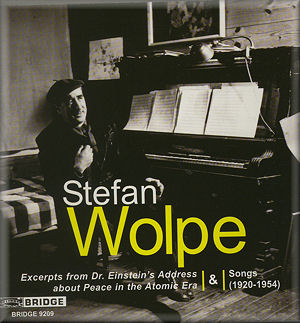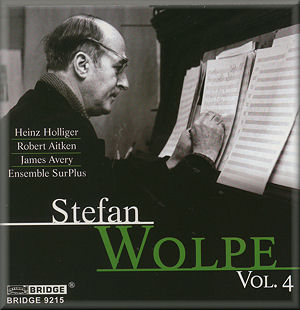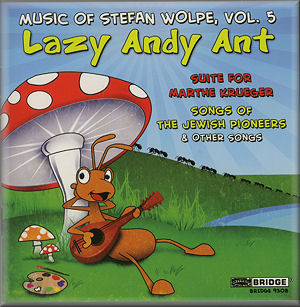 |
 |
| 

alternatively
CD: MDT
AmazonUK
AmazonUS
|
Stefan WOLPE (1902-1972)
Address about Peace
Early Songs (1920) [14:08] *
Arrangements of Yiddish Folksongs (1925) [15:16] **
Songs (7) from the Hebrew (1938 - 1954) [15:30] ***
Der faule Bauer mit seinen Hunden - A Hans Sachs Fable (1926)
[11:14] ****
Epitaph (1938) [2:25] *****
Dr. Einstein's Address about Peace in the Atomic Era (1950)
[6:14] ******
Tony Arnold (soprano)*; Jacob Greenberg (piano)*,***; Irma Wolpe*****;
Robert Shannon (piano)**,****,******; Patrick Mason (baritone)**,****,******;
Ashraf Sewailam (bass baritone)***; Susan Grace (piano)***; Leah
Summers (mezzo soprano)***,*****
24 - 27 October, 2005, Performing Arts Center, Purchase College,
New York, USA. DDD
BRIDGE 9209 [60:06]  |
| 

alternatively
CD: MDT
AmazonUK
AmazonUS
|
The Music Of Stefan Wolpe, Volume 4
Oboe Sonata Fragment (1937) [4:12] *
Sonata for Oboe and Piano, Op. 31 (1938-1941) [18:04] **
Song, Speech, Hymn and Strophe (1939) [1:30] ***
Piece in 2 Parts for Flute and Piano (1959-1960) [16:17]
****
Quartet for Oboe, Cello, Percussion and Piano (1955) [24:30]
*****
James Avery (piano) *,**,***,****; Heinz Holliger (oboe) *,**,***;
Robert Aitken (flute) ****; Peter Veale (oboe) *****; Pascal Pons
(percussion) *****; Sven Thomas Kiebler (piano) *****; Beverly Ellis
(cello) *****; James Avery (conductor) *****
November 2005, Sendersaal Radio Bremen, Germany *,*****
4 March 2001, Glenn Gould Studio, Canadian Broadcasting Corporation,
Toronto Canada****
24 April 1992, Lindlar Kulturzentrum, Germany **
1 May 2006, Grosser Saal, Musikakademie, Basel, Switzerland ***
DDD
BRIDGE 9215 [60:05]  |
| 

alternatively
CD: MDT
AmazonUK
AmazonUS
|
The Music Of Stefan Wolpe, Volume 5
Lazy Andy Ant
Lazy Andy Ant (1947) * [18:15]
Suite for Marthe Krueger ** [22:13]
The Angel (1959) *** [2:33]
Songs for Baritone (2) **** [3:15]
O Captain ***** [4:12]
Songs of the Jewish Pioneers ****** [2:31]
To a Theatre New ******* [4:59]
Susan Grace (piano)*,**; Alice Rybak **; Zac Garcia (voice)*; Mathew
Whitmore (voice)*; Patrick Mason (narrator)*, Wendy Buzby (voice)*,
Alice Rybak (piano)*; Rebecca Jo Loeb (mezzo soprano)**,***,****,******;
Ursula Oppens (piano)**,***,****,*****,******,*******; Quattro Mani
**; Matt Boehler (bass baritone)*****,*******
11 December 2007, Hamilton Recital Hall, The Lamont School of Music,
Denver, Colorado USA *
25, 26 October 2007, Packard Recital Hall, Colorado College, Clorado
USA **
10 March 2009 Performing Arts Center Recital Hall, SUNY College,
Purchase, New York USA ***, ****,******
18 May 2009 Performing Arts Center Recital Hall, SUNY College, Purchase,
New York USA *****,******* DDD
BRIDGE 9308 [57:46]  |
| |
Stefan Wolpe is one of twentieth century music's more colourful
figures. Born in Berlin in 1902, Wolpe was only 14 when he entered
the Berlin Conservatory; before studying composition with Schreker
and Busoni, he also attended the Berlin Hochschule für Musik.
Later, he studied at the Bauhaus and worked with some of the
dadaists. His early style was influenced by Schönberg's serialism.
Then, not unlike Cornelius Cardew fifty years later, Wolpe turned
to what he wanted to be a more accessible style allowing jazz
and 'popular' idioms to predominate … his enduring belief in
socialism, workers' rights and work with and for communist theatre
groups in part suggested this.
Jewish, Wolpe left Nazi Germany in 1933 eventually arriving
in Palestine via Austria where he met and studied briefly with
Webern. Although Wolpe wrote transparent songs for the kibbutzim,
his 'concert' music at that time was too complex for the Palestine
Conservatoire and his teaching contract was not renewed; so
in 1938, Wolpe moved again - to New York where he entered fully
into American artistic life … the abstract expressionists, poets.
For four years in the 1950s Wolpe was director of music at Black
Mountain College. Later still, Wolpe lectured at the summer
schools in Darmstadt. His own pupils eventually included Morton
Feldman, Ralph Shapey, David Tudor and Charles Wuorinen. He
died in 1972.
One senses, though, that even without this set of influences
and experiences, Wolpe would have been the genuinely eclectic,
eccentric even, composer that he was. As a sampler, three CDs
on the enterprising Bridge label not previously reviewed on
MusicWeb International are examined here - partially in the
hope that Wolpe, an otherwise at times misunderstood and overlooked
composer may get his due. To that end the Stefan
Wolpe Society should be investigated too.
So your first impressions of the music on these CDs is likely
to be one of wonder at the span of Wolpe's musical invention.
This is not to say that it lacks centre or focus. Rather, that
Wolpe was his own person and had sufficient confidence and inspirational
strength to tackle whatever occurred to him.
Bridge 9209 contains mostly early music by Wolpe. Dr. Einstein's
Address about Peace in the Atomic Era, though, actually
dates from 1950 and indeed shares - again - an almost naïve,
declamatory tone with the later music of Cardew. It's a setting
of Albert Einstein's response to US president Truman's militaristic
declaration of intent to build a hydrogen bomb … a brave move
both by the scientist and - in McCarthy's America - the freelance
Jewish communist! Its insistent style matching music to text
is redolent of the Kampfmusik which Wolpe had written
in reaction to the Nazis twenty years earlier. As with the other
performances with voice on these CDs, the tone and delivery
are just right and convey everything, one suspects, that Wolpe
wanted to convey.
Then the Ten Early Songs - from 1920, the earliest works
by Wolpe on all three of these CDs - are lyrical, penetrating,
economical and, perhaps above all, full of hope. They were among
the only works which Wolpe chose to preserve when he destroyed
most of the music he had written before 1923. They stand in
the wider German Lied tradition, to which Wolpe necessarily
retained an attachment throughout his life.
Similarly, the Arrangements of Yiddish Folksongs (1925)
appeal to traditions both deep in Wolpe's own sense of self;
and of great current relevance … not least opposition to anti-semitism
in the Berlin of the time. When the seven Songs from the
Hebrew began to be written (1938) Wolpe was nearing the
end of his spell in Palestine. By the time he had finished them,
Wolpe was well-established in the United States. They attest
unequivocally to Wolpe's love of that part of the Mediterranean,
its culture and music. The texts are from a wide range of sources,
including translations into English by the poet Hilda Auerbach
Morley, Wolpe's third wife.
Der faule Bauer mit seinen Hunden (1926) epitomises another
side of Wolpe's sensibility … it might be called subdued farce
- with the emphasis on the subduing, the suppressing. In the
same way that Lazy Andy Ant takes a surrealist, absurd
perhaps, theme and treats it with weight and respect, the tongue
is nowhere near anyone's cheek. For all the opportunity to satirise
Sachs' fable, Wolpe instead draws apt political lessons and
plays the didactic card as deftly as composers closer to Sachs
had the religious cantata. Again, the performers have struck
just the right note and neither exaggerated nor lost the essence
of the work.
It's a tribute to his originality that each of these two pieces
can be performed as convincingly as this. The same high standard
of interpretation holds good for the other works on this CD
… intonation is expressive; the vocal lines are clear and emotionally
convincing; accompaniments support and complement.
Because those involved with these productions in New York expect
an audience to want to understand Wolpe's musical and poetic
priorities, there is land to be laid out - the booklet does
an excellent job of this, for instance. Then it's traversed
clearly and without coyness, fuss or self-consciousness. The
Epitaph is a brief item from a song recital given by
Irma Wolpe (the composer's second wife) in 1938 to words by
an unknown poet. Its inclusion is indicative of the thought
that's obviously gone into sequencing and providing contrast,
tension and variety in the material presented on this CD - and
the others examined here. The singing of Tony Arnold and Leah
Summers is particularly warm yet detached.
Volume 4 in Bridge's important series, the Music of Stefan Wolpe
(Bridge 9215), contains five small-scale instrumental works
dating from the second half of the composer's life. The Oboe
Sonata Fragment is the earliest and dates from 1937; like
the Sonata for Oboe and Piano (1938-1941), it was written
in collaboration with Josef Marx, a virtuoso oboist who assisted
Wolpe is achieving a remarkable blend between Arabic 'folk'
music and several innovative techniques for the instrument,
which we would now call 'extended'. Heinz Holliger and Peter
Veale respectively have the opportunity to demonstrate just
how ground-breaking these two oboe works are.
Holliger also plays on the brief and touching birthday piece
for Irma, Song, Speech, Hymn and Strophe - also written
right at the end of their stay in Palestine; while Veale shines
in the substantial Quartet for Oboe, Cello, Percussion and
Piano of over fifteen years later. The Piece in Two Parts
for Flute and Piano is later still (1959-1960) and also
features the characterful and insightful piano playing of James
Avery; Avery is the pianist for all the other works on this
CD save the quartet, which he actually conducts.
To steer the narrow course between what could sound like remote
indulgence in formats, atonal developments in mainstream twentieth
century European music and Wolpe's own unique view of the world
requires a real empathy with the composer. The musicians on
this CD have just that gift. Unassumingly, they both communicate
what is special, different, unusually blended in Wolpe's conception
and style with all manner of underlying and enduring excitements.
This CD has the additional quality of presenting music that's
in every way typical of the best of the wider Wolpe. The Sonata,
for instance, has the composer's almost jaunty rhythms, certainly
some complex phrasing where the two instruments collaborate
in presenting the thematic ideas - rather than the one accompanying
or mirroring the other. The experimentation with timbre and
texture have the effect of sounding at the same time like more
than two instruments, yet enabling us to follow the lines of
each quite clearly. As with all the performances considered
in this survey, the players manage to blend a sense of adventure
and novelty - in tonal paths, for example - with a self-confidence
in attack, tempi and phrasing. This is an exemplary presentation
of the essence of Wolpe.
The Music of Stefan Wolpe Volume 5 (Bridge 9308) features some
of the least well-known of the composer's works. It too, for
all that, gives a clear idea of just how successful he was in
following his perhaps idiosyncratic, certainly very varied,
musical ideas.
Lazy Andy Ant (1947) is a fable for children suggesting
that what may seem like unconventional behaviour can be beneficial
to the wider weal if understood - and even encouraged. But neither
the composition of the piece, nor its performance here, draws
on moralism or didacticism for impact. It's the simplicity that's
thus unveiled, and the detail, that make the sentiment real.
After all, it's art (of Andy) and the rights of the artist to
be heard that are uppermost. The three pianists and three vocalists
contribute to that truth exceedingly well.
The Suite for Marthe Krueger is also deceptively simple.
It's dance music in three movements and music of beauty, sensitively
yet confidently played here by Ursula Oppens. It's also music
that's barely survived: Wolpe kept no copy of his manuscript
and only because Krueger's student, Sharon Hawkes, approached
the Stefan Wolpe Society with Krueger's own, last and first
(so only) copy was this emotionally rich and evocative piece
preserved is it now able to be heard here in a highly convincing
account. The scenario can only be assumed. But in a way, that's
irrelevant: it's music that stands on its own with hints of
a variety of European composers and Prokofiev; yet which is
poetic and memorable in its own right. In some ways it could
be considered the 'find' of the collection and repays careful
listening.
The Angel from 1959 is to Blake … "I dreamt a dream
- what can it mean?" The other groups of songs, Two
songs for Baritone, O Captain (Whitman on Abraham
Lincoln's death) and the Songs of the Jewish Pioneers
are brief but concentrated. For this, they're all the more memorable.
To a Theatre New is Wolpe's response to the theatrical
possibilities which his new appointment to the faculty of C.W.
Post College at Long Island University in Brookville, New York,
offered.
None of these CDs on their own really sums up what Wolpe was
about - although Bridge 9215 perhaps comes closest. Each, though,
does provide more than a mere slice. The items chosen in each
case, and the way in which they're sequenced - together with
characterful, sympathetic and technically very accomplished
performances - make for compelling listening. The booklets have
ample background and explanations of where each work lies in
Wolpe's corpus and are well illustrated, although the text -
which has not always been perfectly proof read - bleeds too
close to the page edges in places. Similarly, the acoustic of
all the recordings is non-spectacular and so aids our appreciation
of the essence of this very interesting composer. If you're
new to Wolpe's world, the Bridge series is an excellent place
to start. If you already have some in the collection, then you
should add these without hesitation.
Mark Sealey
|
|












